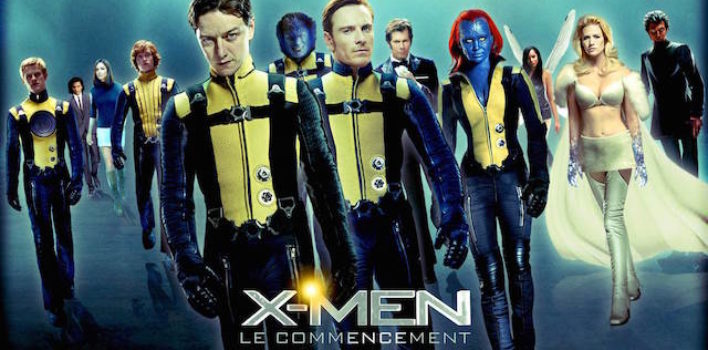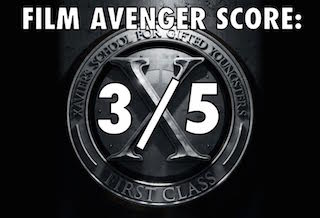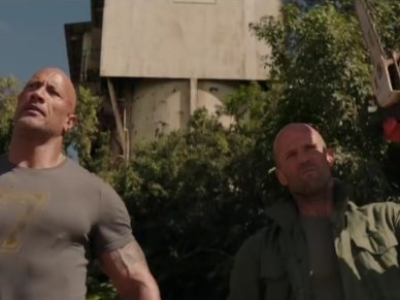Review| X-Men: First Class – No “Better” Man
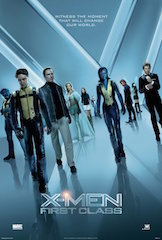 X-Men: First Class was a step in the right direction for this venerable superhero series when it was released. It’s entertaining, imaginative and fun. However, it’s not an exceptional film. Just…okay. The movie didn’t grab me like it should have.
X-Men: First Class was a step in the right direction for this venerable superhero series when it was released. It’s entertaining, imaginative and fun. However, it’s not an exceptional film. Just…okay. The movie didn’t grab me like it should have.
In an effort to keep the franchise going after the not-so-great The Last Stand, 20th Century Fox opted to do a prequel – a tongue-in-cheek look at the origins of the Xavier’s group of strange heroes. It’s based in part on a story for a proposed X-Men Origins film about Magneto. One can still see the remnants of this plan as Erik’s story is clearly at the center of the plot.
The growing conflict between Charles Xavier and Erik Lehnsherr is what keeps this movie interesting. It reflects a similar conflict of ideologies in a real historical struggle against bigotry, as well as the spiritual truth about what part of a person truly matters.
Stuff I Liked
Both James McAvoy and Michael Fassbender are wonderful in this movie as Professor X and Magneto, respectively. They really make the film worth watching. The quiet scenes between the two are the best; one can see them slowly getting ideologically irked by one another. McAvoy is great at maintaining calm, even though the audience can see that he wants to say more to Erik. And Fassbender is exceptional at displaying Magneto’s rage without being over-the-top.
I appreciated all the subtle throwbacks to the original 1963 X-Men comic, particularly the final film costumes with a yellow and blue color scheme. Hank McCoy’s initial physical appearance was also a very clever nod, as his original form in 1963 was decidedly less blue, as in this film.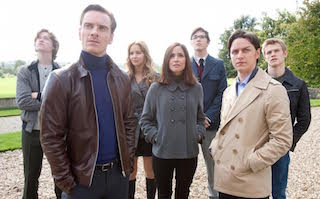
I love historical fiction – a different look at a well-known, real-life event. This movie revolves around the machinations that brought about the Cuban Missile Crisis in 1962. It was an interesting twist on the event, albeit a very fanciful one. Still, it was fun to see the actual news coverage and President Kennedy’s October 22 address to the nation embedded within the narrative.
My favorite piece of historical fiction in the film was the 1960s version of Cerebro – Xavier’s supercomputer capable of detecting any mutant on earth. It truly looks like something Hank McCoy patched together from then-current technology. There are refrigerator-sized consoles and wires everywhere. The headpiece is bulky and crude. It’s a far cry from the sleek, almost Apple-like Cerebro of the earlier films, and it’s wonderful.
I’m a big fan of director Matthew Vaughn’s peculiar brand of frenetic action. With his camera angles, frame speed and sound effects, he has a unique way of making violence that would usually be lost in the noise of an action movie piercing and memorable. The crush of a body hitting the floor. The crack of bone. He makes the violence “hurt,” for lack of a better word. We saw this in Kick-Ass, which was released before this film, and he refined it in last year’s Kingsman: The Secret Service. In First Class, it’s not as broad as those films, but still very effective.
Hugh Jackman’s cameo as Wolverine was clever. It was a short and sweet joke to the audience and I loved it. Logan didn’t need any more time or say anything else.
Stuff I Didn’t Like
Unlike the two central characters, most of the other characters were not interesting or had little development. I didn’t care about them, and they just seemed like empty vessels used to propel the plot forward. Jennifer Lawrence, who was coming into prominence around the time this film was released, was the strongest of the group.
The weakest empty vessel was January Jones as Emma Frost. She had very little range. I still don’t understand why she was there, if for no other reason than to stand around looking pretty and reminding us that she was on Mad Men – a TV series that took place in the 1960s like First Class.
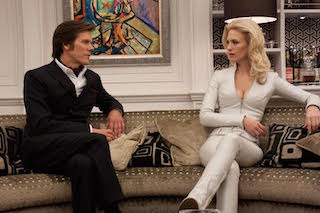 While I do enjoy historical fiction, I do not like it when the technology does not match up with the time period. Sebastian Shaw’s submarine was way too slick and tricked out to be in the 1960s. The design was too modern to me. It seemed very out of place and unexplained (how did he even get a nuclear-powered submarine?). Some of the hairstyles also looked way too modern for 1962, particularly the males. Banshee looked like someone right out of central casting in 2011.
While I do enjoy historical fiction, I do not like it when the technology does not match up with the time period. Sebastian Shaw’s submarine was way too slick and tricked out to be in the 1960s. The design was too modern to me. It seemed very out of place and unexplained (how did he even get a nuclear-powered submarine?). Some of the hairstyles also looked way too modern for 1962, particularly the males. Banshee looked like someone right out of central casting in 2011.
These peculiar anachronisms reminded me of one of my big gripes with Captain America: The First Avenger. The tech that Hydra was sporting looked like something Tony Stark would have designed today.
What annoyed me the most was the very heavy-handed foreshadowing of future events. I did not mind the occasional in-joke, like Professor X hoping he never loses his hair. However, several scenes just seem to magically line up and point to a future outcome the audience knows is coming, and the filmmakers wink at us to make sure we realize it. Magneto’s helmet looks like his helmet from the get-go; the only explanation given is that the Russians made it. So they made it look like a comic book villain helmet?
Stuff to Ponder
The X-Men emerged onto the pop culture scene in 1963 – right in the thick of the Civil Rights Movement. In fact, both Stan Lee and the late Jack Kirby, the creators of the comic, have said in numerous interviews that the struggle against racism and segregation was an influence on the X-Men stories. One aspect of this analogy that has always fascinated me are the parallels with the viewpoints of the two most prominent black leaders at the time.
Dr. Martin Luther King, Jr. was an advocate of non-violence when it came to overcoming bigotry, and his goal was simple respect and dignity for blacks. He dreamed of a world where blacks would be able to be an equal part of American society, with no regard for race whatsoever. Similarly, Professor X and his team of mutants struggle to be understood by humans, wishing to be recognized and respected, not feared. In fact, it’s what drives Xavier’s team to be heroes – to prove to the human populace that they are good.
On the other side of the movement was Malcolm X – an angry, militant activist who preached hatred against whites and the supremacy of blacks. In addition, Malcolm X advocated violence as a means to getting equality. Magneto follows a similar bent: shaped by cruel treatment at the hands of humans, he sees mutants as the superior beings and responds to the hatred of humans with his own mutual loathing.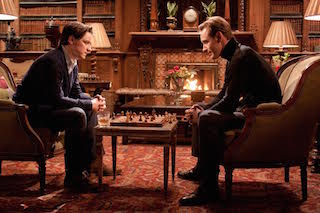
Influenced heavily by his Christian faith, Dr. King’s philosophy of non-violence eventually found favor with many Americans, as they saw King and his peaceful protestors being beaten by aggressive, hateful whites on television – showing the racists for what they were.
“The heart is deceitful above all things and beyond cure. Who can understand it? I the Lord search the heart and examine the mind, to reward each person according to their conduct, according to what their deeds deserve.” Jeremiah 17:9-10
In his most famous speech, Dr. King dreamed of a day when blacks would be judged “not by the color of their skin, but by the content of their character.” Internal character taking precedence over outside appearance is central to the film’s themes, as well as God’s perception of us. As Jesus said, “For out of the heart come evil thoughts, murder, adultery, sexual immorality, theft, false testimony, slander. These are what defile a person” (Matthew 15:19-20). God looks at our heart above all else because that’s where sin is born.
Xavier recognized that there are good mutants and bad mutants, just as there are good humans and bad humans. It all comes down to the person and their behavior, not specifically their powers. Skin color has absolutely no bearing on what makes a good or bad person; your heart and mindset do.
 Magneto concentrates on the differences in people on the outside. Erik’s inability to let go of his anger and hate has sullied his view of humanity and eats away at his heart. He pridefully assumes that all humans are the same because of the horrible actions of a few. He sees himself as a “better man” because of his evolved physical abilities, but he eventually becomes just as much of a killer as his enemy, Sebastian Shaw.
Magneto concentrates on the differences in people on the outside. Erik’s inability to let go of his anger and hate has sullied his view of humanity and eats away at his heart. He pridefully assumes that all humans are the same because of the horrible actions of a few. He sees himself as a “better man” because of his evolved physical abilities, but he eventually becomes just as much of a killer as his enemy, Sebastian Shaw.
The truth is there are no “better men.” We are all equally sinful human beings in the eyes of God, and no amount of evolution is ever going to change that. We can pretend that we are more evolved, but we are still capable of doing terrible things to each other. What breaks the cycle of violence, bigotry and hatred are forgiveness and grace, as exemplified by Jesus Christ and His grace toward us.
The irony is that Malcolm X eventually renounced his hateful ideology, and was tragically murdered because of it while Magneto embraces his rage. Erik had the opportunity to let go of his hate and walk away but ended up becoming the thing that he supposedly hated: a murderous bigot.
So What I’m Trying to Say is
X-Men: First Class is definitely worth a look. It’s not the best X-Men film, but it’s still fun and, at times, thought-provoking. This film was a definite step in the right direction for the series. And what has come after, namely Days of Future Past has only solidified this assertion.
The X-Men were born from the fight against real-life hate and bigotry, and reflect the opposing ideologies involved in the Civil Rights Movement, to a point. The film carries this over wonderfully, personified by Magneto and Xavier. Physical appearance (or in the case of the X-Men, mutant powers) must not have any bearing on the worth or perception of a person. God looks at the heart of every individual. Similarly, we should look at people’s character, not skin color, and forgive transgressions at every opportunity. Only then can we be on our way to becoming like Christ, who was in fact not just a better man, but the best man.


